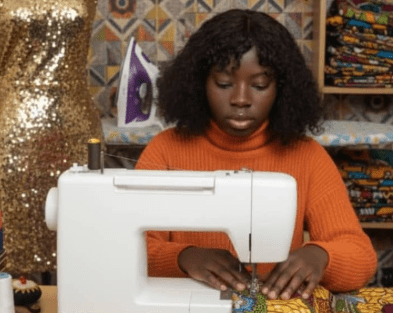Creative designer and writer Oyefeso Sekinat Ejimoh is steadily building a name for herself in the African-inspired fashion space, drawing from culture, personal experience and a passion for sustainability.
From garments to thought-provoking articles, Oyefeso is weaving together fashion, identity and empowerment in ways that continue to attract attention within and outside the creative community.
Oyefeso, who combines fashion design with writing and community engagement, said her work is simply an extension of how she sees African culture in a modern world. According to her, the goal is not to imitate tradition but to reinterpret it.
“I see my work as a conversation between heritage and modern design,” she said. “I love taking elements of African culture—textiles, symbols, craftsmanship—and giving them a fresh meaning. I make sure I understand what each element represents so that even when I modernise it, it remains authentic.”
Her journey into fashion is not the straightforward path many expect. With an initial background in Business Administration, she gained organisational and management skills before fully embracing the creative route.
She also has experience working in health and social care, both in Nigeria and the UK. According to her, the period helped her develop empathy and discipline.
“Those experiences shaped how I relate with people and how I understand their needs,” she said. “My designs reflect people and their stories, not just fabric.”
Oyefeso is currently a member of four professional fashion associations, something she considers instrumental to her growth. She explained that belonging to these groups has helped her stay informed about new developments in the industry.
“These associations expose me to trends, sustainability ideas and new techniques. I’ve met people I would never have connected with on my own, and through those networks, I’ve had opportunities to collaborate and also mentor others,” she said.
Sustainability is a big part of her work. She prefers fabrics that are ethically sourced or recycled and often works with pieces made by local artisans.
“I try to reduce waste by paying attention to pattern drafting. I also upcycle leftover materials and design pieces that can be used in different ways,” she said.
She continued, “It’s important that African fashion grows in a way that respects both the environment and the people who make the materials.”
Apart from designing clothes, Oyefeso also writes. Over the past few years, she has published more than 20 articles on Medium, touching on fashion, creativity, culture and entrepreneurship.
She said writing has helped her think differently about her work.
“Writing forces me to slow down and reflect. It helps me explain my ideas clearly and understand what drives my designs,” she noted.
Her long-term vision includes setting up her own sustainable fashion brand in the UK. She hopes to use the platform to support young designers and create more opportunities for women in the creative sector.
“I plan to start mentorship programmes and organise workshops that help women build confidence—not just in design, but in leadership and business,” she said.
When asked what advice she would give women trying to start fashion businesses in a tough economy like Nigeria’s, she encouraged them to remain focused and creative.
“Start with what you have. Use local resources and build your identity from there,” she said. “Technology is your friend. Use social media to push your work out there; you never know who is watching. Work with other creatives so you can reduce costs and learn from one another.”
She added that consistency is still the most important ingredient.
“Keep learning and don’t lose confidence. Nigerian women are already breaking boundaries; there’s space for more to make an impact,” she said.
For Oyefeso, the future of fashion is not just about the clothes—it is about culture, responsibility and people. And as she continues to blend African artistry with sustainable modern design, her work is contributing to a rising movement that places creativity and community at the centre of fashion.
















